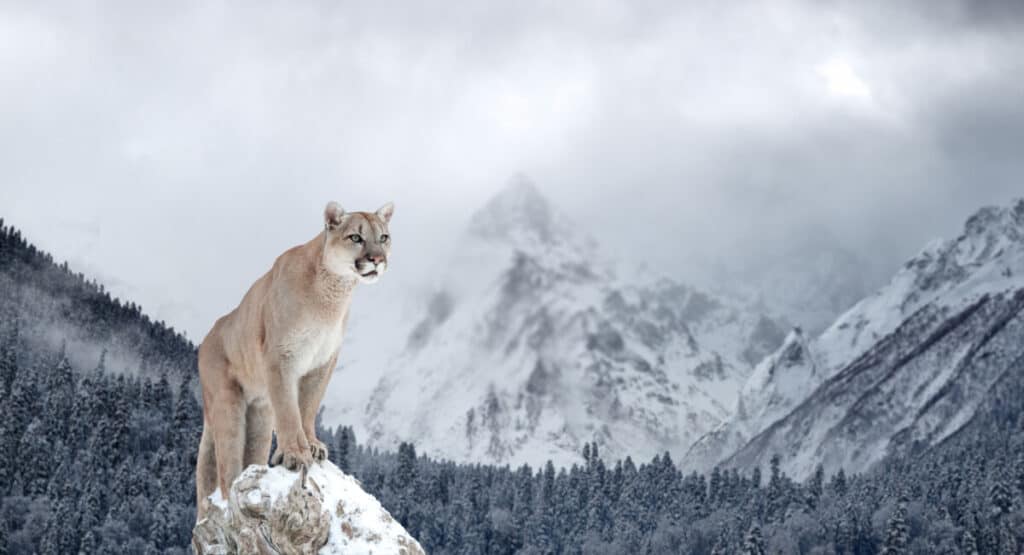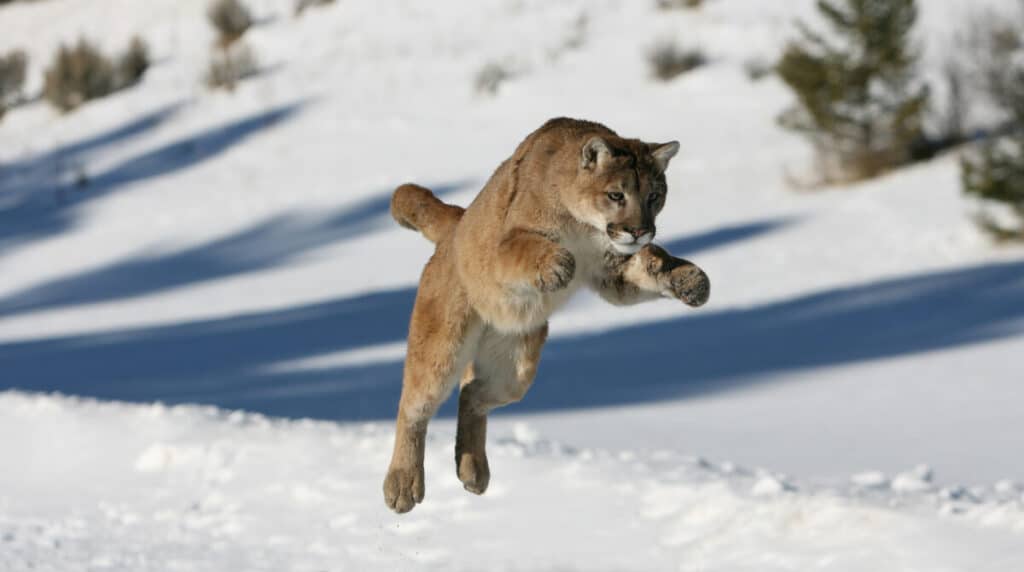Cougars, also known as mountain lions or pumas, are large cats found in the Americas. They are known for their stealth and agility, making them one of the most effective predators in North and South America. A key factor that contributes to their success as hunters is their exceptional sensory abilities. Cougars have been observed to rely heavily on their senses to survive in the wild.
Cougars have exceptional sensory abilities, including visual acuity, binocular vision, night vision, acute hearing, and a keen sense of smell. These sensory abilities are crucial for their survival in the wild, as they rely on them heavily to locate prey and avoid threats. Human encroachment into their habitats has altered their sensory perception, making it more difficult for them to detect prey and avoid danger. Captivity can have a negative impact on a cougar’s sensory abilities, further highlighting the importance of their natural environment for their survival.
In this article, we will explore how good the senses of a cougar really are. We will delve into the cougar’s keen eyesight, acute hearing, powerful sense of smell, and how they use these senses to hunt and navigate territory. Furthermore, we will examine how evolution has shaped these senses over time and how human activity affects them. The study of cougar sensory abilities can provide insight into predator-prey relationships and help us understand more about how animals interact with each other in the wild.

The Importance of Sensory Abilities in the Wild
The sensory abilities of wild animals are crucial for survival in their natural habitats. These senses allow them to navigate their environment, locate prey or potential mates, and avoid danger. The importance of sensory abilities in survival can be seen in the examples of predators such as cougars. Cougars rely on their acute sense of hearing and vision to stalk prey and avoid being detected by other animals.
However, captivity can have a negative impact on an animal’s sensory abilities. Sensory deprivation in captivity is a common problem for zoo animals or those kept as pets. This lack of stimulation can lead to a decline in sensory function, which may result in difficulty adapting if they are released back into the wild. Therefore, it is important that we consider the consequences of keeping wild animals in captivity and find ways to provide them with appropriate stimulation and enrichment to maintain their sensory abilities.
Cougars’ Natural Foes: Unmasking Their Predators
Sight: The Cougar’s Keen Eyesight
With exceptional visual acuity, the cougar is able to spot prey from great distances. Its eyesight is among the sharpest in the animal kingdom, allowing it to accurately perceive its surroundings and track down prey with precision. Cougars have a binocular vision that provides them with depth perception, which enables them to judge distances accurately. This ability is essential for hunting as it allows them to stalk their prey and pounce when they are within striking distance.
In addition to their keen daytime vision, cougars also possess impressive night vision capabilities. Their eyes have a high concentration of rod cells, which are responsible for detecting light in low-light conditions. This adaptation gives cougars an advantage while hunting at night, where most of their prey animals are active. With acute senses like these, it’s no wonder that cougars are such efficient predators in the wild.
Hearing: The Acute Hearing of Cougars
Possessing an acute sense of hearing, cougars are able to detect even the slightest sounds made by their prey. Their ears are highly sensitive and can pick up frequencies that are beyond human range. Cougars have a unique ability called sound localization, which means they can determine the direction and distance of a sound source by using information from both ears. This enables them to accurately pinpoint the location of their prey, even in dense vegetation or low light conditions.
Cougars use their acute hearing to detect potential threats as well. They can hear other animals approaching from far away and will often retreat or hide if they sense danger. In addition, cougars communicate with each other through vocalizations such as growls, hisses, and screams. These sounds can be heard over long distances and help establish territories or attract mates. Overall, the acute hearing of cougars is a vital tool for survival in their natural habitat as it allows them to efficiently locate prey, avoid predators, and communicate with others of their kind.
Elk’s Predators Exposed: Unveiling the Natural Foes
Smell: The Powerful Sense of Smell in Cougars
Cougars rely heavily on their olfactory system to navigate through their environment and locate prey. Their sense of smell is so powerful that they can detect a scent from over a mile away. This adaptation allows them to track potential prey, identify territorial boundaries, and avoid danger.
Cougars have several olfactory adaptations that make their sense of smell highly effective. They possess an enlarged vomeronasal organ, also known as Jacobson’s organ, located in the roof of their mouth. This organ contains specialized sensory cells that can detect pheromones and other chemical signals in the environment. Additionally, cougars have a larger surface area in their nasal cavity compared to humans, which increases the amount of air that comes into contact with olfactory receptors. These adaptations enable cougars to accurately detect the location of prey and assess its freshness based on scent cues, making them efficient hunters in their natural habitat.
Hunting Strategies: How Cougars Use Their Senses to Hunt
Through the effective utilization of their olfactory system and stealthy movements, cougars are able to successfully hunt their prey in their natural habitat. Hunting techniques employed by cougars vary depending on the size and type of prey they are targeting. For instance, when hunting larger animals like elk or deer, cougars rely on stalking and ambushing their prey from a distance. They use their keen sense of smell to detect any potential threat or opportunity for food.
On the other hand, when targeting smaller prey such as rodents or rabbits, cougars use quick bursts of speed to catch them off-guard. Their agility and power enable them to make swift maneuvers that allow them to capture their target with ease. In fact, research has shown that adult cougars can leap up to 30 feet horizontally and jump up to 18 feet vertically in a single bound. This impressive skill set is what makes cougars one of the top predators in their ecosystem, capable of taking down even larger animals if necessary. Prey selection is an essential part of this process as well since it dictates which hunting technique will be most effective for each situation.
| Hunting Technique | Prey Selection |
|---|---|
| Stalking/Ambushing | Larger Animals (Deer/Elk) |
| Quick Burst of Speed | Smaller Prey (Rodents/Rabbits) |
Navigation: How Cougars Use Their Senses to Navigate Territory
The ability of cougars to navigate their territory with precision is a testament to their exceptional sensory perception and adaptability in the wild. Cougars have keen eyesight that allows them to see in low light conditions, making it possible for them to hunt at night. Their night vision is aided by a reflective layer behind their retinas, called the tapetum lucidum, which amplifies any available light, allowing them to see even in complete darkness. This ability gives them an advantage over prey that are mostly active during the day.
Apart from having excellent vision, cougars also rely on their sense of smell and hearing to navigate through their territory. They use scent marking as a way of communicating with other cougars and demarcating their territories. Their sense of hearing is highly sensitive, enabling them to detect sounds from miles away. However, when faced with sensory deprivation due to factors such as snow or rainstorms, they can become disoriented and lost. Despite this challenge, cougars’ adaptability allows them to adjust quickly and continue successfully navigating through unfamiliar environments.

Adaptations: How Evolution Has Shaped Cougar Senses
Evolutionary pressures have shaped the sensory perception of mountain lions, allowing them to thrive in their environment. The cougar’s acute senses are a result of millions of years of adaptation to their surroundings. For example, their sharp vision allows them to see prey at great distances, while their sensitive whiskers help them navigate through narrow spaces. Their keen sense of smell enables them to detect potential threats and prey from miles away.
However, these evolutionary advantages come with sensory trade offs. For instance, the cougar’s excellent night vision comes at the cost of reduced visual acuity during the day when compared to diurnal predators like eagles or hawks. Additionally, due to the need for stealthy hunting techniques, cougars have sacrificed some aspects of their hearing in exchange for improved vision and scent detection abilities. Nonetheless, these adaptations have allowed cougars to be incredibly successful hunters and apex predators in their environments for millions of years.
Human Interaction: How Human Activity Affects Cougar Senses
Human encroachment into cougar habitats has altered their sensory perception, affecting their ability to detect prey and avoid potential threats. As human disturbance increases in cougar territories, the animals experience sensory deprivation due to noise pollution and habitat fragmentation. These disturbances affect their hearing abilities, making it difficult for them to perceive subtle sounds that could indicate the presence of prey or predators.
Furthermore, human activities such as logging and construction can alter the landscape significantly, creating obstacles that limit a cougar’s ability to move around freely. This situation results in a loss of hunting grounds and increased competition for resources among cougars. Additionally, human activity also brings about an increase in artificial light sources at night which disrupts natural circadian rhythms. This disruption affects the visual acuity of cougars at night when they are most active, exposing them to increased risk from predators or collisions with vehicles on roads near urban areas.
Conclusion
The cougar’s sensory abilities are essential for its survival in the wild. With keen eyesight, acute hearing, and a powerful sense of smell, cougars are well-equipped to hunt prey and navigate their territory. These senses have evolved over time to adapt to the cougar’s environment and hunting strategies.
However, human activity has had a significant impact on cougar senses. Habitat destruction, noise pollution, and other disturbances can disrupt their ability to hunt effectively or navigate their territory. Understanding the importance of these senses is crucial for conservation efforts aimed at protecting this species.
In conclusion, the cougar’s sensory abilities play a vital role in its survival in the wild. Their keen eyesight, acute hearing, and powerful sense of smell allow them to thrive in their natural habitat. However, human activity poses a threat to these senses and must be addressed through conservation efforts that aim to protect this magnificent animal species.
